Lt. Col. Geoffrey Demarest, JD, PhD, U.S. Army, Retired
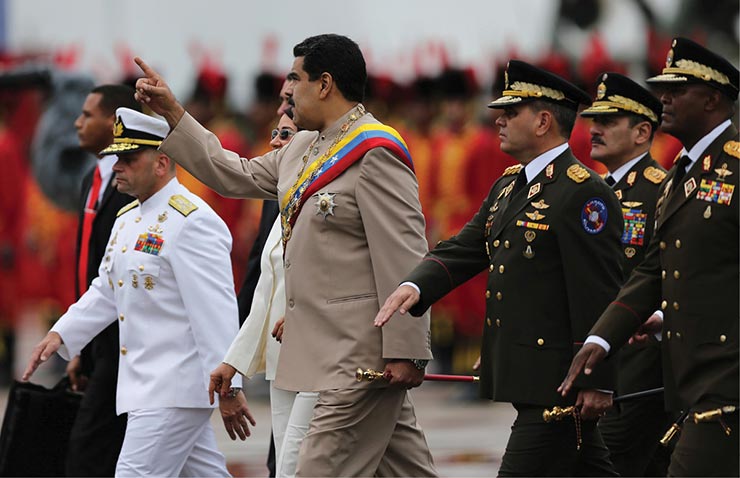
As the economy in Venezuela collapsed over the course of the last several years, media coverage of the situation increasingly focused on the steep decline in living standards of the general population, the resulting misery, and the emergence of mass refugee flows to neighboring countries. The ruling socialist regime in Caracas (hereinafter, Bolivarian) was reasonably blamed for Venezuela’s tragedy, leading some more assertive opinionmakers to call for senior Venezuelan military leaders to abandon obedience to Nicolás Maduro as their chief executive and instead align their loyalty to the regime’s political opposition, which had gained a compelling share of formal internal and external recognition.1 Although there had been localized mutinies, the military services in general remained notably unresponsive. The central reason for this unresponsiveness is that the senior military leadership is part of the same corrupt hierarchy that caused the catastrophe. Humanitarian concerns among foreign political leaders, especially those of South American countries, resulted in diplomatic measures being taken against the Maduro regime. The hope was apparently to force a regime change by isolating the Maduro administration diplomatically, by strangling its finances, and therewith, by instigating an internal coup of some kind. However, to the general and unwarranted mystification of the media and pundits alike, Maduro showed sufficient political resilience to maintain his position within the Bolivarian hierarchy.
Adding to the complexity and danger of the situation was the direct presence of Russian military forces, with small military contingents deployed to Venezuela. Russian presence operations have also included the periodic visitation of nuclear-weapons-capable aircraft and large warships; the overall intention was evidently to undergird the Bolivarian dictatorship and its resolve—an intention which, in retrospect, was realized.
The prevailing sense of confusion in the media emanated in part from a convergence of (1) inadequate consideration of Venezuela’s place in the greater circum-Caribbean context, (2) wishful thinking regarding the actual vulnerabilities of the Maduro dictatorship, and (3) misunderstanding of the Bolivarian political and economic infrastructures. Bolivarian rule, if not Maduro’s role in it, was and remains all but impervious to a military coup as such. The military senior leadership is broadly co-opted into the greater regime’s criminal enterprise, if not its ideology, guided by a large Cuban presence funded in turn by the Russians, Chinese, Turks, Iranians, and others. This year, the U.S. government announced arrest warrants and accompanying bounties for the apprehension and delivery of Maduro, Diosdado, Cabello and other senior regime leaders.2 Even if successful, how such arrests might change the presence and grip of Cuban Communist Party (PCC) elements over the reins of control in Venezuela is unclear.
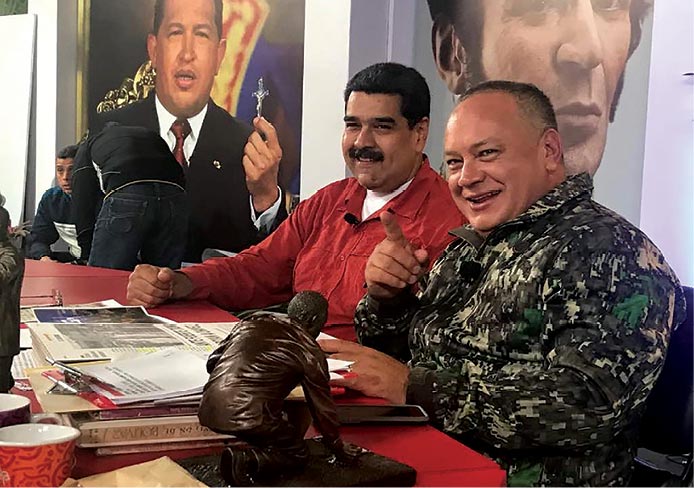
Venezuela’s disputed President Nicolás Maduro (left) joins the president of the Venezuelan National Constituent Assembly, Diosdado Cabello, to celebrate the two hundredth chapter of the “Con el Mazo Dando” program 12 April 2018 on set in Caracas, Venezuela. Cabello is host of the program that is broadcast on the Venezuelan state channel, Venezolana de Televisión. (Photo courtesy of the Bolivarian Government of Venezuela)
Former senior Venezuelan general Diosdado Cabello is widely reported to be the current head of the Cartel of the Suns, a criminal drug-trafficking syndicate made up of senior Venezuelan generals who work closely with the Colombian drug cartels that reputedly have insinuated themselves into all branches of the Venezuelan armed forces and National Guard. The Cartel of the Suns reportedly originated in the 1990s among junior military officers working at the Colombian-Venezuela border who became involved in drug trafficking by initially taking bribes and assisting drug cartels with smuggling operations, and then expanding their scope of operations as they moved up in rank. Today, this syndicate ostensibly has on the payroll virtually all two thousand senior leaders of the military together with many former military leaders and civilian officials now working in civilian government administration. One asserted result of the military’s deep involvement in extremely lucrative drug-trafficking relationships is that there is little incentive for senior military leaders to abandon the current status quo in support of a change in government leadership. As a result, Cabello has emerged to be one of the most powerful political figures in Venezuela, perhaps having more actual power over the armed forces than Venezuela's disputed President Nicolás Maduro himself. As a result, some observers assert that Cabello and the Cartel of the Suns are so deeply entrenched in Venezuela’s civil administration that they will remain in place even if Maduro is forced to leave office. For detailed press reports on the reputed Venezuelan kleptocracy, visit https://www.insightcrime.org/investigations/venezuela-mafia-state/ and https://www.vice.com/en_us/article/yw8e4y/venezuelas-government-is-so-corrupt-it-basically-has-its-own-cartel.
The notion of a military coup in Venezuela, and for that matter, the notion of changing out Maduro at the top, has had far less effective meaning than has been accorded to it, not just because there was no incentive for a coup, but because the replacement of Maduro and his immediate cronies by any of Venezuela’s current senior military leaders would likely be no more than self-coup theatrics by the same Bolivarian organizational hierarchy. Venezuelan army generals remain materially secure because of lucrative relationships with illicit drug and other transnational criminal enterprises. They have also been allowed to arrange for safe places for their families to live—contingent, of course, on their loyalties. Moreover, their position is enhanced by their control of weapons, of which the opposition has none. However, that the loyalties of senior Bolivarian military leaders is maintained by material benefits does constitute a vulnerability. One might assume that some of these leaders could be swayed to betray their Bolivarian masters if offered an alternative package of positive material benefits, but such an offer only addresses one half of an “offer he can’t refuse.”
It is particularly disconcerting that even if the opposition were somehow to successfully oust the current Bolivarian regime as led by Maduro, maybe 15 percent of a population of about twenty-seven million might remain loyal or obedient to Bolivarian party leadership. Accordingly, the aftermath of a successful overthrow of the dictatorship could present a residual and persistent armed struggle. While an improvement, a simple overthrow would not preclude the unfortunate continuation of the regional irregular war that has been going on for decades, frustrating efforts in neighboring countries Colombia and Brazil to resolve their own security issues. Colombia’s fifty-year war against the Revolutionary Armed Forces of Colombia (Fuerzas Armadas Revolucionarias de Colombia-Ejército del Pueblo, or FARC-EP, hereinafter referred to as FARC) should serve to dampen hopes of some complete defeat of leftist military power or the attainment of complete civil rest. The FARC war, moreover, was never confined to Colombia. The current Venezuela problem, in other words, is in no way confined to Venezuela, nor will it be. It is also not going to be satisfactorily addressed without admitting the full geographic scope of the war, clearly naming those organizational entities that are culpable for its prosecution and bringing decisive coercive pressure to bear directly against them.
In an effort to help the reader gain a better understanding of the intertwined forces negatively affecting Venezuela and the entire region, I identify in this article the malign network of diverse organizations that exists in Latin America today. I also provide a series of observations that illuminate how the organizations in that network relate to each other. This information is intended to unravel some unnecessary complications in the analysis of dangers and prospects in northern South America and the Caribbean. Hopefully, it will inform readers’ perspectives as they consider various calls to action, whether internal or external.

Figure. Interrelated Political Parties and International Organizations of Latin America (Graphic by author)Enlarge the figure
The Anti-American Network in Latin America
To better understand the threat that the situation in Venezuela implies for the entire hemisphere, one need only become familiar with the ideological signaling and collaborative habits of an armful of organizations whose leaders appear to be principally responsible for Venezuelan suffering. There exists in Latin America a sophisticated network of interrelated political parties and international organizations (depicted in the figure) that bear watching because they are actively anti-American, antiliberty, and generally destructive.3
It would be useful and prudent for security analysts and policy makers to be cognizant of these organizations and their interrelationships, intentions, and capacities. The network’s components are woven by ideology, material objectives, and overlapping leadership and representation. So, to a degree, they are better analyzed as a regional composite threat rather than as individual organizations. To that end, I offer an overview of the structure of those political parties and international organizations most relevant to the current goings-on in northern South America and the Caribbean. I highlight a network of revolutionary-left parties and conclude with a working hypothesis regarding the network’s conspiratorial prospects. Again, observing political parties and their interrelationships can be as revealing, if not more, for the purposes of geopolitical prediction and planning, than assessing the region using national states or countries as the standard units of action.
First tier. The Cuban Communist Party (Partido Comunista de Cuba, or PCC) with its subordinate United Socialist Party of Venezuela (Partido Socialista Unido de Venezuela, or PSUV) are at the apex of the regional anti-American network collective.4 Also, although not currently in control of the reins of its country’s central government, the Brazilian Workers’ Party (Partido dos Trabalhadores, or PT) is a third leading organization within the whole network.5
Second tier. After the PCC, PSUV, and PT, the second tier of country-headquartered parties are the Sandinista National Liberation Front (Frente Sandinista de Liberación Nacional, or FSLN) in Nicaragua and the Dominican Liberation Party (Partido de Liberación Dominicana, or PLD) in the Dominican Republic. These two organizations wield enhanced influence within the composite in that they control their respective country-level governments.6 They both positively associate themselves with the PCC and PSUV. The PLD (along with other leftist parties of several smaller island countries in the Antilles) may be of note at this time, given the strategic geographic location of Hispaniola and the rest of the Antilles in terms of international smuggling routes.7 The PLD, however, seems to be in a more tenuous geopolitical position than the FSLN or the Bolivian Movement to Socialism (Movimiento al Socialismo, or MAS) as to public support of the PSUV.8 Until recently, the MAS party in Bolivia fit into the collective in a similar way as the Dominican PLD and the Sandinistas. That party, however, incurred a setback in late 2019 due to overreach in electoral fraud. Bolivian President Evo Morales was ousted from office and forced into exile in late 2019 on the strength of a police uprising backed by military inaction. With Morales went a number of senior administrative leaders from the MAS. However, the ouster did not affect the legislature, which that party still dominates.9 Meanwhile, ex-President Morales has been heartily supported by the network of leftist nongovernmental organizations, chief among them the Puebla Group.
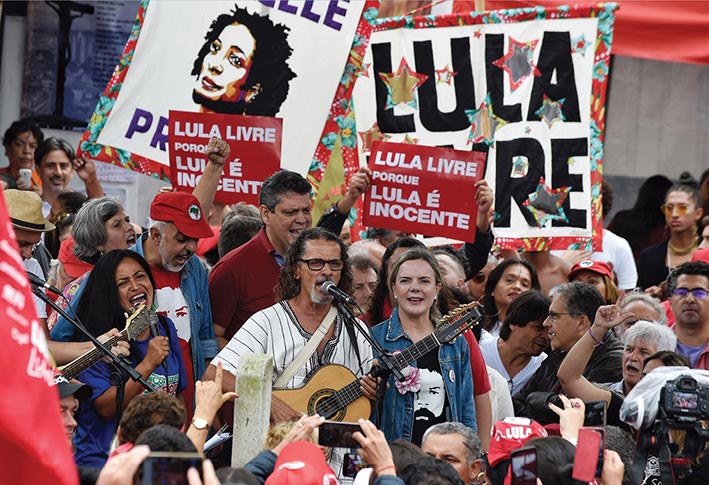
Workers’ Party President Gleisi Hoffmann (center right) attends a demonstration 7 April 2019—the anniversary of the incarceration of former Brazilian President Luiz Inácio Lula da Silva—outside the jail where Lula is being held in Curitiba, Brazil. While Lula serves a twelve-year sentence for corruption and money laundering, he and his party maintain his innocence and claim persecution by political enemies to prevent him from running again for president. (Photo by Denis Ferreira Netto, Associated Press)
Key political party umbrella organizations. There are numerous other expressly anti-American parties of peripheral significance, with the extended set conveniently outlined in the membership rolls of two major umbrella organizations, the Forum of São Paulo (Foro de São Paulo, or FSP) and the Permanent Conference of Political Parties of Latin America and the Caribbean (Conferencia Permanente de Partidos Políticos de América Latina y el Caribe, or COPPPAL).10
A newer, third entity is the aforementioned Puebla Group. Its name comes from the first publicized meeting in Puebla, Mexico, in July 2019.11 The Puebla Group appears to be a coordinator, a protective society and holding pen for the region’s most senior leftist leaders, including and especially ousted personalities such as Morales and Brazilian ex-president Lula da Silva. As such, it has instantaneous influence.
Key transnational and international facilitating organizations. Finally, several regional international organizations are prominent within the collective. These include the Union of South American Nations (Unión de Naciones Suramericanas, or UNASUR), the Community of Latin American and Caribbean States (Comunidad de Estados Latinoamericanos y Caribeños, or CELAC) and the Bolivarian Alliance for the Peoples of Our America (Alianza Bolivariana para los Pueblos de Nuestra América, or ALBA).12
Transnational Criminal Organizations
Additionally, parts of the party network are involved at various points and depths with international organized criminal organizations and activities of various types. Several, for instance, have been openly and mutually supportive of, and by, the FARC and the National Liberation Army (Ejército de Liberación Nacional, or ELN). Both the ELN and FARC have enjoyed increasing levels of impunity inside Venezuelan territory.13 With regard to those groups specifically, in the past few years, the FARC has taken on a mixed character as a political party and an armed force. The FARC did not shed its revolutionary socialist orientation after having nominally signed an agreement to end its war with Colombia, nor did it shed its drug trafficking portfolio. Meanwhile, the ELN has displaced the FARC as the preeminent Colombian guerrilla warfare structure. It uses Venezuela as a sanctuary territory, with its senior leadership commanding from Havana. In both cases, the FARC and the ELN are heavily involved in illegal drug trade, illegal mining activities, and other criminal activities.14 Also worth noting is criminal implication of members of the PSUV, the Brazilian PT, and the Forum of São Paulo in the Odebrecht scandal, which is perhaps the largest international corruption enterprise in the history of the hemisphere.
Extraregional Governmental Support
The whole of this organizational fabric is difficult to visualize through the lens of the international country system, but we can reasonably presume the components will display certain behaviors. Among these behaviors is propagandistic and material cooperation with governments outside the hemisphere that are of security concern to the United States. Such outside nations prominently include the governments of Russia, China, Iran, and perhaps Turkey.15
Cuban Communist Party. The EcuRed website, which is evidently an official PCC Cuban government site billing itself as a “Project of the Constitution of the Republic of Cuba,” lists Communism, anti-imperialism, Marxism-Leninism, and Martiism as the main planks of the party’s political ideology, and it lists the FSP and COPPPAL as its main international affiliations.16 According to an EcuRed essay, the Constitution of the Republic of Cuba defines the Cuban Communist Party as the “organized Martiist and Marxist-Leninist vanguard of the Cuban nation, the highest directive force of the Society and the State.” The EcuRed website also hosts a page for the Nicaraguan FSLN.17
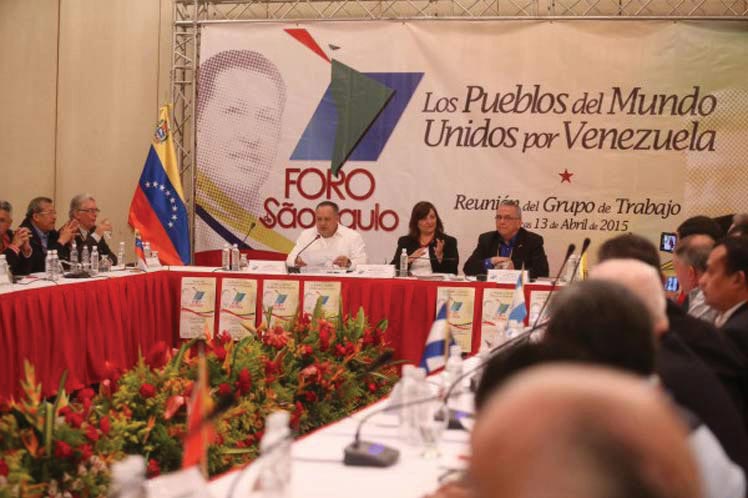
Members of the Forum of São Paulo (Foro de São Paulo) from Latin America and the Caribbean meet 13 April 2015 in Caracas, Venezuela, to ratify their support for Venezuela's disputed President Nicolás Maduro. The meeting was held in the face of a U.S. decree issued by President Barak Obama declaring the South American country a threat to U.S. national security. (Photo courtesy of the São Paulo Forum)
The PCC hosted the Forum of São Paulo’s 2018 plenary meeting in Havana. A senior PCC central committee member opined,
This is about left forces uniting without losing their identities, but on the basis of a political program. What is impossible is transforming society without the unity of left forces, and that they take power. At this time, there is nothing more solid than the FSP, in which existing problems can be discussed, as well as ways to build unity.18
Raúl Castro, who recently relinquished his position as President of Cuba, remains the PCC leader. Regarding the PCC’s international affiliations, the web page of the International Meeting of Communist and Workers’ Parties, as well as those of COPPPAL and the FSP, list the PCC as a member.19 While addressing key positions in international policy, Raúl Castro said in 2016,
Despite the fact that we have never encouraged other countries to abandon this organization, I must reiterate what was expressed in Brazil, some years ago now, paraphrasing José Martí, that before Cuba returns to the OAS [Organization of American States], “the ocean of the North will join the ocean of the South, and a serpent will be born from the egg of an eagle.”
It is imperative to continue moving forward with the consolidation of CELAC as a mechanism of genuinely Latin American and Caribbean joint political action, based on the concept of unity in diversity.20
United Socialist Party of Venezuela. The PSUV’s official page references, and provides online, the Libro Rojo (Red Book), the founding document of the party, in which the party’s ideological identifiers are listed. The lead item listed as a founding principle is “Anti-capitalist and Anti-imperialist.”21 The PSUV’s webpage also features an article on the 2018 FSP Conference in Havana, noting that the conference called for solidarity in support of Venezuela, Nicaragua, and the people of Brazil. Interestingly, this call for solidarity was voiced by the prime minister of Saint Vincent and the Grenadines, Ralph Gonsalves, who spoke to the gathering.22
Brazilian Workers’ Party. The PT official web page does not feature an assertion regarding its international affiliations or mention the Forum of São Paulo.23 The current president of the party is Gleisi Hoffmann, but Luiz Inácio Lula da Silva and Dilma Rousseff are better known, both ex-presidents of the country. Rousseff was impeached and removed from office in 2016. The PT nevertheless ran her as a senate candidate from Minas Gerais state in the October elections, but she lost. Lula, meanwhile, was convicted in 2017 of corruption and is now serving a jail sentence. He too, was nevertheless leading in opinion polls as a PT candidate for the presidency. One of his disciples and a stand-in candidate, Fernando Haddad, then lost the general election to Jair Bolsonaro. Bolsonaro is considered anti-PT. Although the PT is now out of power, it can hardly be considered powerless. In early February 2019, the PT announced a new alliance of several of Brazil’s far-left parties to oppose the new president.24
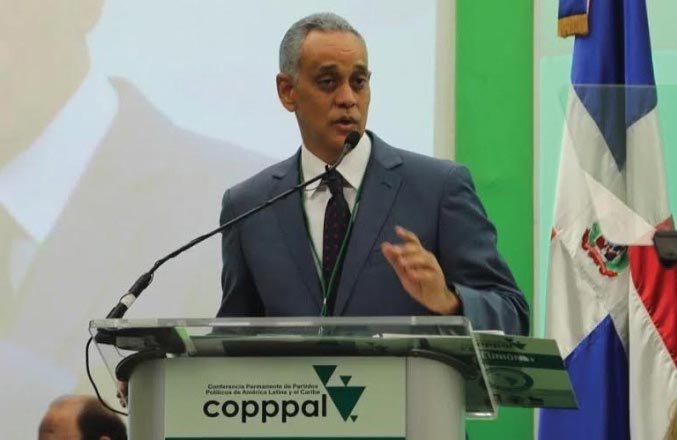
Manolo Pichardo speaks at a Permanent Conference of Political Parties of Latin America and the Caribbean (Conferencia Permanente de Partidos Políticos de América Latina y el Caribe, or COPPPAL) meeting 2 June 2016. COPPPAL activities focus on supporting regional progressive actions of like-minded organizations—mainly socialist, communist, and left-leaning labor and populist/nationalist political parties—aimed at establishing and extending the influence of socialist-oriented regimes and policies. (Photo by Mihail García via Wikimedia Commons)
The Forum of São Paulo. The FSP was established in 1990 by Fidel Castro and Luiz Inácio Lula da Silva with the purpose of encouraging mutual support among the region’s revolutionary leftist parties and building strategic solidarity in the face of the post-Soviet reality in which major support of indigenous socialist movements had stopped. In addition to the on again/off again governmental control exercised by parties noted in the previous paragraphs, there are several other FSP parties currently exercising the offices of the chief executive of their respective countries. These include the PAIS Alliance (Alianza PAIS [Patria Altiva y Soberana]) party in Ecuador, the Farabundo Martí National Liberation Front (Frente Farabundo Martí para la Liberación Nacional, or FMLN) in El Salvador, the Broad Front (Frente Amplio, or FA) in Uruguay, and the National Regeneration Movement (Movimiento Regeneración Nacional, or MORENA) in Mexico. Ecuadoran President Lenin Moreno appears currently to be distancing PAIS and his government from the Bolivarian block, apparently favoring improved relations with the new anti-Bolivarian administration in Colombia. The Salvadoran FMLN recently lost an election and will soon be out of power, while MORENA, a relatively new construction, has potential to greatly increase its profile within the overall network.
According to the FSP official website, Colombian parties in the FSP include the following:
(1) Patriotic March (Marcha Patriótica)
(2) Progressive Movement (Movimiento Progresista)
(3) Green Alliance Party (Partido Alianza Verde)
(4) Colombian Communist Party (Partido Comunista Colombiano)
(5) Alternative Democratic Pole (Polo Democrático Alternativo)
(6) Here for Socialism (Presentes por el Socialismo)
(7) Patriotic Union (Unión Patriótica)
(8) Citizen Power Movement (Movimiento Poder Ciudadano)
All of the above-listed Colombian parties favor continuation of the agreement reached between the administration of former Colombian President Juan Manuel Santos and the FARC. This is noteworthy because the FARC-government agreement, its future and the future of several institutions and legal mechanisms created under its aegis can significantly affect the power of the anti-American network generally.25
The most immediate change in the prospects of the FSP as the primary umbrella organization for leftist parties came with the October 2018 election of anti-PT Jair Bolsonaro as president of Brazil. As a Colombian observer noted, “With Bolsonaro, the Forum of São Paulo, strategic center of the disastrous Latin-American left (Castro, Lula, and Chávez) should disappear.”26 In Mexico, recently elected President Andrés Manuel López Obrador (popularly known as AMLO), who appears to have had a personal affinity for the Cuban Revolution, created MORENA, which is a party member of the FSP.27 AMLO and MORENA, however, may prefer to exercise regional influence through its presence in COPPPAL than in the FSP because COPPPAL employs more Mexican personnel and has a distinctly Mexican provenance.
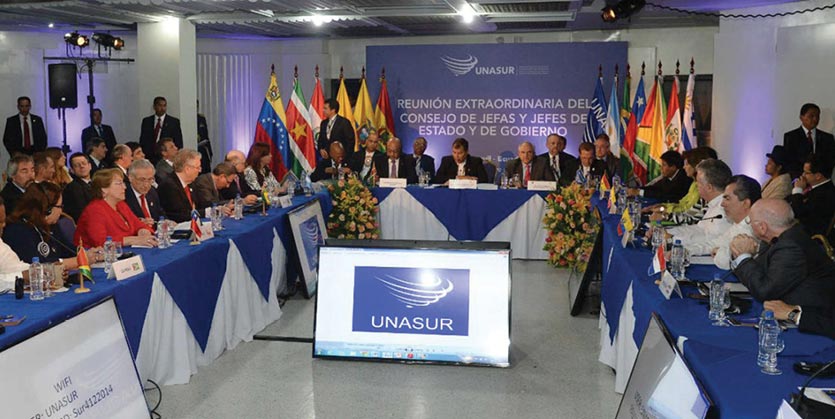
Representatives participate in the Special Meeting of the Council of Heads of State and Government of the Union of South American Nations (Unión de Naciones Suramericanas or UNASUR) to transfer the pro tempore presidency of UNASUR 4 December 2014 in Guayaquil, Ecuador. Founded by Venezuelan President Hugo Chávez as an alternative to the Organization of American States, which he asserted was an instrument of U.S. colonial domination, UNASUR activities focus on supporting regional progressive actions of like-minded organizations aimed at establishing and extending the influence of socialist-oriented regimes and policies. (Photo courtesy of the Government of Chile via Wikimedia Commons)
Permanent Conference of Political Parties of Latin America and the Caribbean. The lead article on the official COPPPAL website in late October 2018 asserted the successful conclusion of COPPPAL’s thirty-sixth plenary meeting that month in Panama City.28 The president of COPPPAL is Manolo Pichardo from the Dominican Republic (where COPPPAL currently has its headquarters). Pichardo used part of his speech to the gathering to express support for the then imprisoned Brazilian Luiz Inácio Lula da Silva.29 Although COPPPAL seems to have fewer overt member parties than the Forum of São Paulo, the two have in common their communities of parties with ideological affinity rather than forums of governments.30 In terms of institutional health and influence, COPPPAL may fare better than the Forum of São Paulo during the next few years if for no other reason than the recently elected Mexican president is decidedly socialist and pro-COPPPAL, whereas the recently elected president of Brazil, Jair Bolsonaro, is decidedly anti-socialist and opposed to the Forum of São Paulo.
COPPPAL also might experience some participation, funding, and mission expansion as a result of UNASUR’s contraction, even while the latter is an ostensibly governments-based international organization. Notably, Jorge Arias of the Cuban PCC is listed as an adjunct executive secretary on the COPPPAL website.31
Pichardo is a member of the PLD, the party of the country’s president. The PLD is also listed as a member of the Forum of São Paulo. Gustavo Carvajal Moreno, member of Mexico’s Institutional Revolutionary Party (Partido Revolucionario Institucional, or PRI), is COPPPAL’s vice president. COPPPAL projects an academic effort through the Instituto de Formación Política Gustavo Carvajal Moreno, which according to the COPPPAL website offers an academic program on political leadership for the twenty-first century. Notably among the class offerings is a course titled, “The Importance of CELAC in the Current Political Context.”
Community of Latin American and Caribbean States. According to its website, “CELAC is an intergovernmental mechanism for dialogue and political agreement … By mandate of the Heads of State and Government, CELAC is the unified voice of the region on issues of consensus. Regarding the representation of Latin America and the Caribbean; CELAC takes its faculties to act as spokesman for the community with other countries and regional blocs.”32
The last summit conference of the organization (its fifth) was held in Punta Cana, Dominican Republic, in January 2017.33 The CELAC website does not provide complete information regarding attendance but does include a document titled “Political Declaration of Punta Cana, Summit V of the Chiefs of State and Government of CELAC.”34 Regarding the control of Venezuela, the following is of interest among the document’s numerous resolutions:
We support the process of national dialog in the Bolivarian Republic of Venezuela between the Government and the opposition of said country, under the oversight of the Secretary General of UNASUR, Ernesto Samper, ex-presidents José Luis Rodríguez Zapatero, Leonel Fernández, Martín Torrijos, and the special representative of his Holiness Pope Francisco … and under the principle of respect for non-intervention in the internal affairs of States.35
Also of note,
We consider the return to the Republic of Cuba of the territory occupied by the United States Naval Base in Guantánamo … must be a relevant element of the process of normalization of relations between the two countries.36
CELAC is a product of organizational and diplomatic efforts by leaders in the PCC and PSUV, but with a less decidedly South American continental flavor than UNASUR. Launched circa 2011, it is newer than UNASUR and seems to have a relatively compact geographic and bureaucratic footprint centered on the Caribbean as well as a smaller budgetary overhead. As for extraregional relations, the following statement is revelatory:
Regarding the representation of Latin America and the Caribbean; CELAC takes its faculties to act as spokesman for the Community with other countries and regional blocs. This includes the CELAC dialogue with the European Union, China, the Russian Federation, the Republic of Korea, the Cooperation Council for the Arab States of the Gulf, Turkey and Japan.37
Union of South American Nations. UNASUR was created circa 2005–2008 on the initiative of Hugo Chávez as an alternative to the Organization of American States. Its purpose, beyond the typical structure for sinecures and fluidity of travel for party loyalists, was to create another formal mechanism in international law for influence within the hemisphere and beyond. As with other international organizations formed under the auspices of the PCC, PSUV, and PT, UNASUR expressly excluded the United States. Perhaps due to its obvious control by and preference for the owners of Latin American twenty-first-century socialism, the organization never enjoyed universal support among the national governments of the hemisphere. After the deaths of Hugo Chávez and Fidel Castro, and the general swing to the right of the hemisphere’s ideological pendulum, UNASUR today finds itself in precipitous decline.38
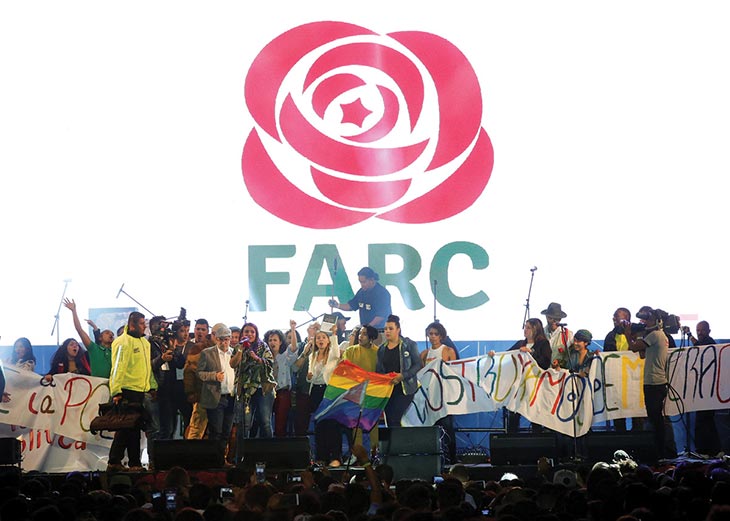
Supporters listen as Revolutionary Armed Forces of Colombia–People’s Army (Fuerzas Armadas Revolucionarias de Colombia—Ejército del Pueblo or FARC-EP) leader Rodrigo Londoño, known by his nom de guerre Timochenko, speaks 1 September 2017 during the launching of the new political party Revolutionary Alternative Common Force at the Plaza de Bolivar in Bogotá, Colombia. (Photo by Jaime Saldarriaga, Reuters)
Bolivarian Alliance for the Peoples of Our America. ALBA was also formed by PCC and PSUV leaders as a counterbalance to the Organization of the American States and has its headquarters in Caracas. At its founding, it specifically excluded membership by the United States. It is older than both UNASUR and CELAC, having been founded circa 2003. ALBA is styled as a governments-based international organization, and while smaller in terms of participating countries (currently nine) than UNASUR or CELAC, it presents itself as the most decidedly resolute in support of the PCC and PSUV.39 Ecuador and Honduras were early members, but the governments of those two countries have quit the alliance. Ostensibly focused on economic facilitation among its members, ALBA advances PCC and PSUV positions on a complete range of international issues. Notably, the Dominican Republic’s government does not appear to be represented as an official member.
Revolutionary Armed Forces of Colombia—Army of the People. In August 2017, together with voting delegates from the Clandestine Communist Party of Colombia, the FARC rebranded itself as a political party; the Alternative Revolutionary Force of the Majority (Fuerza Alternativa Revolucionaria del Común). But even the latter seems to maintain, at least informally, the lettering FARC-EP, with the EP standing for Army of the People (Ejército del Pueblo).40
The entity was to be a nonviolent political party with the attendant legal attributes and privileges. Since late 2016, prospects of the electoral-politics FARC have been bound up in the power-sharing agreement the FARC reached with then Colombian President Juan Manuel Santos. One leading analyst, Diego Molano, observed that rather than two FARCs, we might recognize three,
One FARC as a political party, which has not abandoned the [illicit drug trafficking] business … Another FARC as dissidents that continue to manage all the crops, routes, and to attack the population. And another that camouflages itself within the ELN in order to continue with the business.41
In a later development, there are indications that FARC might be experiencing an internal schism, with some of its leadership more personally bound to the political potential of the agreement with the Colombian government and others of the FARC secretariat returning or clinging to the more belligerent business model.42 FARC and FARC-EP may soon further define themselves one from the other, both organizationally and geographically.43 We should also keep in mind Diego Molano’s observation about the third FARC—that the FARC and ELN may have a highly cooperative relationship.
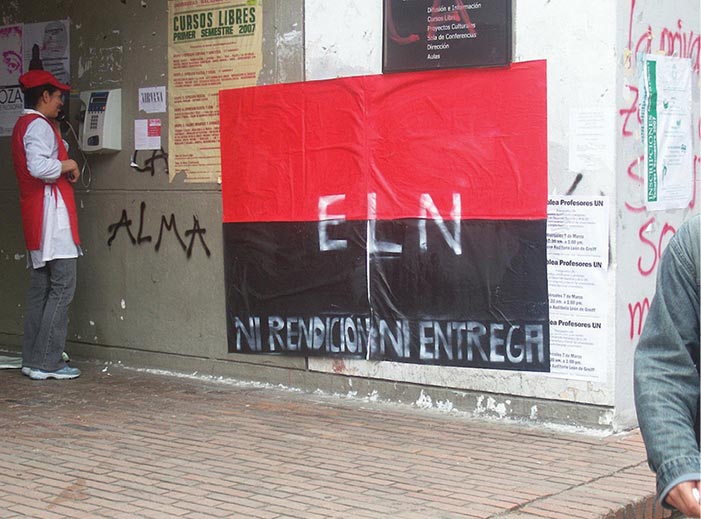
A National Liberation Army (Ejército de Liberación Nacional) guerrilla poster 7 March 2007 at the León de Greiff Auditory, National University of Colombia in Bogotá. The poster reads "Ni Rendición, Ni Entrega," which translates to “Neither Surrender, Nor Yield.” (Photo by Julián Ortega Martínez via Wikimedia Commons)
National Liberation Army (Ejército de Liberación Nacional, or ELN). In its beginnings a university- and urban-based insurgency, the ELN has long been the lesser sibling to the FARC. Yet, while the FARC was attempting to demobilize as a result of agreements with the Colombian government, the recent FARC reorganization and possible internal schism may have redounded to the benefit of the ELN as it moved to fill an insurgent void left by the demobilizing FARC forces. As a result, there are some indications that we may be witnessing the ascendance in status of the ELN within the Bolivarian movement, especially as an enforcement arm of its PSUV and PCC hosts within and near Venezuelan country borders.
Regarding the overall increase in ELN activity, especially inside Venezuela, there has been ample reporting, including to the effect that it is a welcome element within the Bolivarian control structure.44 The FARC and ELN are perhaps to be considered two of several Bolivarian armed forces.
Traditional forces. Other organizational elements of the anti-American network worthy of our concern include the several intelligence services of the PCC and PSUV, as well as the formalized military wings of those parties, including the country-level regular armed forces that the PCC and PSUV control.45 Of note among the latter are the Bolivarian National Armed Force (Fuerza Armada Nacional Bolivariana, or FANB) and its subordinates, including the Bolivarian National Guard of Venezuela (Guardia Nacional Bolivariana de Venezuela, or GNB). There may exist some amount of discord and disaffection within and among these more formal pieces of the network.46 Still, it appears that the PCC continues to consolidate and strengthen its dominant position as to their control.47
Prospects
The ascendance to power of anti-leftist political parties and party alliances in Colombia and Brazil presents a threat to some of the organizations of the leftist network described in this article.48 That antileft threat could accelerate within the next couple of years as those administrations consolidate control over their respective government apparatuses, especially their intelligence services. These administrations could come to challenge the core or apex organizations within the leftist consortium—the PSUV, and ultimately, the PCC. Any such trend, however, may have been offset somewhat by the recent re-possession of executive power in Argentina by a leftist (President Alberto Fernández was a cofounder of the Puebla Group). A recent news story regarding the freezing by the Argentinean courts of assets thought to be associated with Hezbollah is potentially a test case in this regard.49 The event was related to the apprehension in Brazil of known money-launderer Assad Ahmad Barakat. Some consider that to be related in turn to another recent event, the detention in Cape Verde of Alex Saab, suspected money launderer for the Bolivarians.50 It was not known at the time of this writing if Alex Saab would be extradited to U.S. law enforcement or how the Fernandez administration in Argentina would proceed as to the frozen Hezbollah assets. In any case, the news begins to illuminate the weave of relationships among geopolitics, transnational crime, and ideology.
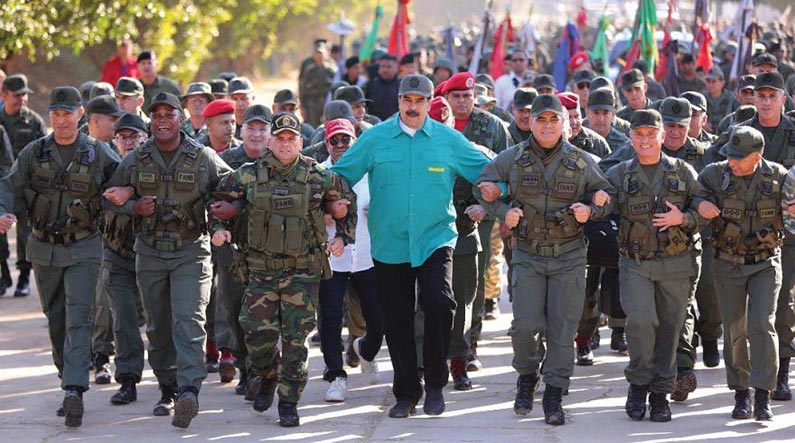
Venezuela's disputed President Nicolás Maduro marches with members of the Venezuela’s armed forces 27 January 2019 during military exercises at Fort Paramacay in Naguanagua, Carabobo State, Venezuela. (Photo courtesy of the Office of the President of Bolivaran Republic of Venezuela)
If indeed there exist reasonable prospects of significant blows being delivered to the power of the PSUV and PCC, several extraregional entities are likely to be alarmed enough to take active countermeasures as they could lose consequential global strategic advantage were the two parties to be disempowered.51 For example, a loss of power by the PCC and PSUV would directly affect the status quo of control (mostly in Venezuelan territory) over natural-resource exploitation infrastructures. The natural resources flowing from or through Venezuelan territory reasonably constitute the single greatest material prize in Latin America for several extraregional actors. Those most affected would include the current regimes in Russia, China, and Iran, all of which have placed major economic bets to secure portions of Venezuela-based natural resource treasure. Additionally, a significant weakening of the PCC would in turn be likely to weaken the secondary members of the consortium as well as other of the region’s transnational smuggling cartels.
As for the handful of international organizations facilitating the network, those organizations (FSP, COPPPAL, CELAC, UNASUR, ALBA, and now the Puebla Group) would weaken without the active presence of the PCC and its oversight. Meanwhile, given their membership rolls and stated purposes, those organizations appear highly unsuitable as partners or vehicles for U.S. plans and programs. Contrarily, they might best be considered as targets for monitoring and debilitation.
As a final note, it would be a useful strategy-making practice to discuss developments within the region according to affiliated political party identities and their associating multinational organizations rather than by country name (e.g., Venezuela or Cuba). The engine of the region’s effective anti-Americanism and threat to U.S. interests is less a phenomenon to be associated with countries or their peoples than it is with certain of the region’s political parties acting in concert. These are the real loci of destructive coercive power in the region, the mens rea. For example, any discussion of the future of Venezuela that does not revolve around the actions, reactions, and survivability of the Cuban PCC is incomplete and necessarily misleading.
No comments:
Post a Comment